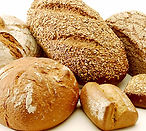The Benefits of Wholegrains
Studies show that eating wholegrains instead of refined grains lowers the risk of many chronic diseases. While benefits are most pronounced for those consuming at least 3 servings daily, some studies show reduced risks from as little as one serving daily.
Therefore, the message is: every wholegrain in your diet helps!

For further information on wholegrains versus refined grains – please visit:
http://www.fuldkorn.dk/english/
http://www.cerealsandhealth.com/
http://www.healthgrain.eu/pub/background.php
http://wholegrainscouncil.org/
Which Type of Grain to Choose?
Wholegrains instead of refined grains
Wholegrains lower the risk of many chronic diseases
Studies show that eating wholegrains instead of refined grains lowers the risk of many chronic diseases. Of course, these benefits are most pronounced in the context of an overall healthy diet. No one food – even wholegrains – will guarantee good health. It's also important to remember that some wholegrain foods are healthier than others. Plain grains - from brown rice and quinoa to wheat berries – and wholegrain pasta should be a regular feature on your table, with processed grains eaten less often.
Types of grains, wholegrains and cereals
Grains include wheat, barley, oat, rye, corn, rice, millet and triticale.
Wholegrains include whole meal or wholegrain breads or crispbreads, dark ‘seedy’ breads, wholegrain breakfast cereals, wheat germ, brown rice, puffed whole grains, bulgar, couscous, popcorn and oatmeal.
Refined cereals include cake, desserts, white bread, pasta, muffins, sweet or savory biscuits, refined grain breakfast cereals, white rice, pancakes, waffles and pizza.
Grains consist of three major parts, including:
-
Bran – the outer layer of the grain (fibre, omega-3 fatty acids, vitamins and dietary minerals)
-
Endosperm – the main part of the grain (mainly starch)
-
Germ – the smallest part of the grain (vitamin E, folate, thiamine, phosphorus, magnesium).
Wholegrains contain all three layers of the grain. Whereas when grains are refined (for example, to produce white flour), the bran and germ layers are generally removed, leaving only the endosperm. This process can cause significant losses of fibers, vitamins, minerals, antioxidants and phytochemicals from the grains.
Refined cereals are high in added sugar, fat and salt
Refined cereals often have high levels of added sugar, fat or salt, and generally have a higher GI than their wholegrain equivalents. Eating refined cereals causes a sharp rise in blood sugars and a strong response from the pancreas, which is not good. Therefore, choose wholegrain foods whenever you can – preferably organic.
The main benefits of wholegrains
The benefits of wholegrains most documented by repeated studies include:
-
stroke risk reduced 30-36%
-
type 2 diabetes risk reduced 21-30%
-
heart disease risk reduced 25-28%
-
better weight maintenance
Other benefits indicated by recent studies include:
-
reduced risk of asthma
-
healthier carotid arteries
-
reduction of inflammatory disease risk
-
lower risk of colorectal cancer
-
healthier blood pressure levels
-
less gum disease and tooth loss







